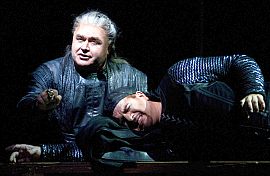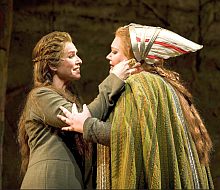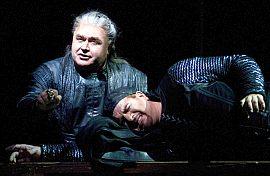 His holding back or “soldiering” through Siegfried Act 1’s sword-forging allowed him to end stronger in the finale scene, the awakening of Brünnhilde. Good thing he toughed it out. The cover tenor reportedly had never actually performed this punishing endurance contest of a role.
His holding back or “soldiering” through Siegfried Act 1’s sword-forging allowed him to end stronger in the finale scene, the awakening of Brünnhilde. Good thing he toughed it out. The cover tenor reportedly had never actually performed this punishing endurance contest of a role. With the satisfying conclusion of Siegfried, a certain tension or suspense that it successfully developed carried the Ring Cycle to its final opera on Friday. Helped immeasurably by a major revision of the closing Immolation scene, a conception entirely different from that of the 2005 version of the production, Götterdämmerung became the strongest production of the series.

and Hagen (Daniel Sumegi)
All considerations of production conceptions aside, whether Richard Wagner’s Ring is transported into the 19th, 20th, or 21st centuries and to locations as far removed as America or Pluto, the music, the singing, and the playing must rise to the transporting level. In fact, for so-called régie or auteur productions, the farther “out” they are and the more anachronistic, the better the performance must be. For the current Seattle Ring, in the second revival of the Stephen Wadsworth/Thomas Lynch production, the handsome traditional realism helps the spinning of Wagner’s good yarn and suits the aesthetic and style of his music perfectly, thank you very much. It’s the kind of staging the music was written for. You want fanciful philosophical or political applications? Use your imagination or go read books.
Musically, this show works, not brilliantly, not inspiringly, but thoroughly and well, even given one important vocal miscasting and recurrent problems in the orchestral winds. In each of the cycle’s last two operas, a single singer lit the spark. With Andersen singing on two cylinders, Act 1 of Siegfried had been flat, for all his bouncing about boisterously, a youth in everything but girth. The fun and energy of Siegfried’s coming of age at the dwarf Mime’s hut and forging the magic sword never came to life. But soon after, in Act 2, Richard Paul Fink, as Alberich, launched the drama. His richly sinister tone and manner, diction, and projection — the best in this cast — made evil welcome, and even preferred, during the dwarf’s confrontations with Wotan (sung by Greer Grimsley) and his brother Nibelung, Mime (Dennis Petersen). The opera never looked back.
Happily Humanizing the Myth
Siegfried is the Ring’s happy, lively opera, with the hero’s awakening the dragon with his horn call and killing him. Fafner emerged from his cave in the form of a giant, snaky, Disneyland monster sporting a pair of elephant tusks in his gross, multicolored head, a huge bat-wing looming up behind. Director Wadsworth strews his favors here and there: Wotan plants a rose on the path for his grandson Siegfried to pick up and savor; nothing if not a good sport, Siegfried sits fondling the dead monster’s head, regretting having had to kill this jolly companion with the loudspeaker bass voice (Daniel Semegi); a bird marionette, discovered in the birch forest, bobs up and down as the Forest Bird (Julianne Gearhart) pipes up to Siegfried.
Wadsworth continues humanizing the myth during the colloquy that Wotan initiates with Erda after wakening and summoning her out of a crevice in a sheer rock wall. Motivated, I suppose, by Wotan’s acknowledgment of Erda (Maria Streijffert) as the mother of his illegitimate Valkyrie offspring, Wadsworth has the pair embracing, caressing, and hand-holding like old lovers. This must surprise Wagnerites accustomed to seeing Erda float in and out as a kind of spooky, otherworldly earth mother, with Wotan traditionally addressing her respectfully as if she were the Delphic oracle herself. For some viewers, the familiarity displayed here might have neutralized the illuminating warmth and sincerity of the affectionate, clearly spousal relationship between Wotan and Fricka that this production tellingly establishes.
In any case, it diminishes Wotan who, during the ensuing Wotan/Siegfried confrontation at the foot of Brünnhilde’s mountain, is taken down all the way. Wadsworth completes the humiliating conversion of the god of gods into mortal, having him thrown roughly to the ground by his son. The twilight of the gods is premature. Das Ende occurs one opera too early. In this scene, Greer Grimsley sang, or rather oversang, aggressively. The leathery quality in his many-faceted voice took over, the sound becoming forceful, the emotion becoming that of desperation rather than fierce determination.
In the climactic and final scene, Andersen gave a winning account of Siegfried’s overcoming trepidation and innocence after discovering Brünnhilde, the first woman in his life. His portrayal of conflicted emotions was charming, his growing confidence driven by newfound passion overcoming newfound fear. Andersen’s tenor is fine, well-placed, and always in tune, but it could use more metal in the sound. It has body and moderate power, though not quite at the Heldentenor level, being mellifluous but without the reserve that supports a long line. He and Janice Baird, the Brünnhilde, played the tensions, the give-and-take magnetic pull to their ultimate union. She was dynamic in her ardor at the recognition of her rescuer, in her resistance to their union, in her final climactic surrender.
Blythe Comes Gloriously to the Fore
Götterdämmerung’s first scene was as static as ever, treading water as Wagner’s sibyls, the three Norns, gave yet another rewinding of the story to that point
Waltraute (Stephanie Blythe)
Comparisons can be awkward, though in that scene there was no dodging the contrast between Blythe and Janice Baird, Seattle’s Brünnhilde. Baird, a comely woman, graceful and lithe, moves like a dancer and acts up a storm (even if Wadsworth does encourage the melodramatic in her), yet she lacks the voice for this role. It’s powerful, yes — focused, direct, and keen as a knife — but, like a knife, it’s metallic and often unpleasant and harsh, and an obtrusive vibrato doesn’t help. Strangely enough, it’s best, full and embracing, in her topmost notes. It’s hard to fathom why the complexities should be cleared away at high C.
The production does well by the Gibichung clan. Their hall, which Siegfried inspects wonderingly after stopping there on his way down the Rhine, is handsomely done, in a quiet Germanic design, in wood of medium tone, with tasteful carvings and minimal decoration and furniture. The Gunther of Gordon Hawkins is a bear of a man, with appropriately lusty, voluminous tone. He is shown as a man of some conscience, led, almost taunted, into the drugging and betraying of Siegfried by his evil brother Hagen (Daniel Sumegi). His remorse at Hagen’s killing of Siegfried rang true, a strong presence.
Sumegi has a complex voice, with hardly much “forward” singing at all, and what he does to color and amplify makes his German virtually incomprehensible. Still, he was a dominating, sinister protagonist, fulfilling his fateful role. When Hagen is sleeping while on watch at the hall during the absence of Siegfried and Gunther on their mission to abduct Brünnhilde, the ghost of his father, Alberich, appears as a dream figure to urge Hagen’s theft of the Ring. Usually, we just hear Alberich (Fink), but this time he appears, his hair now white, and sings to the dormant Hagen. It was most effective. During Siegfried’s Tarnhelm-enabled disguise as Gunther, Hawkins appears for himself, but it is Andersen’s tenor voice singing for him (through a screened aperture in the wall of Brünnhilde’s Lair). The reason Brünnhilde doesn’t recognize the voice of Siegfried is a matter, I suppose, of suspended disbelief.
Serious Problems in the Pit
During the four operas, but more so in Götterdämmerung, orchestral flaws were easily evident and distracting, casting discredit on the Seattle Symphony from which most players were drawn and also on the Ring’s conductor, Robert Spano. Serious and consistent problems of intonation and tone quality were heard in the first and bass clarinets, in the trumpet during prominent long solos, in the low brass (especially trombone), and in the horns — of all the critical
The Gutrune was Marie Plette, whose pleasing soprano and presence were initially muted but rang out clear when at last she reveals her role in drugging Siegfried and commits suicide. Earlier, the male chorus of Gibichung clansmen/warriors, more than 50 strong, produced a grand and rousing torrent in anticipation of the wedding feast.
The scene of Siegfried’s final encounter with the three Rhinemaidens, followed by his assassination at the hands of Hagen, was placed outside the lair of the dragon (from Siegfried, Act 2). The mermaids emerged and splashed in the small pool at center stage; the entrances and funeral procession were enacted on the zigzagging upward path to the higher birch forest, stage left. Andersen gave an affecting account of Siegfried’s recounting his exploits and ultimately his recovered memory of Brünnhilde, concluded by Hagen’s fatal spear thrust.
The last scene, which I had been dreading in recollection of it from 2005, was the triumph, with high credit for the stunning lighting to Peter Kazczorowski. Baird’s display of Brünnhilde’s outrage was fiery. She took command. Her singing of the Immolation scene was the crown of her performance, the voice more open and enveloping than ever earlier. The wholly changed finale had an attendant lead the horse Grane into the “flames” behind a scrim covering the left half of the stage, but this time without Brünnhilde riding him. The hall scenery disappeared and now, behind a full scrim, Brünnhilde moved to and fro with Hagen reaching for the Ring on her finger. The Rhinemaidens “swam” down on their flying rigs, dispatching Hagen, and the immolation was complete. The gods appeared, this time on a midstage elevation, where the flames enveloped them, as Wotan embraced and kissed Fricka, completing the cycle in grand manner. As the music settled into its final major chord, the scene changed, reverting to the original forest scene, empty and now lit brightly, signifying a new beginning.

